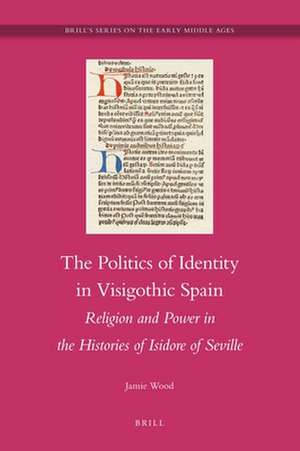The Politics of Identity in Visigothic Spain: Religion and Power in the Histories of Isidore of Seville: Brill's Series on the Early Middle Ages, cartea 21
Autor Jamie Wooden Limba Engleză Hardback – 19 mar 2012
Preț: 716.34 lei
Preț vechi: 873.59 lei
-18% Nou
Puncte Express: 1075
Preț estimativ în valută:
137.07€ • 143.50$ • 113.42£
137.07€ • 143.50$ • 113.42£
Carte indisponibilă temporar
Doresc să fiu notificat când acest titlu va fi disponibil:
Se trimite...
Preluare comenzi: 021 569.72.76
Specificații
ISBN-13: 9789004209909
ISBN-10: 9004209905
Pagini: 276
Dimensiuni: 155 x 235 x 21 mm
Greutate: 0.59 kg
Editura: Brill
Colecția Brill
Seria Brill's Series on the Early Middle Ages
ISBN-10: 9004209905
Pagini: 276
Dimensiuni: 155 x 235 x 21 mm
Greutate: 0.59 kg
Editura: Brill
Colecția Brill
Seria Brill's Series on the Early Middle Ages
Cuprins
Acknowledgements ... vii
List of Abbreviations ... ix
Notes on Contributors ... xi
Preface ... xiii
Restless Peasants and Scornful Lords: Lay Hostility to Holy Men and the Church in Late Antiquity and the Early Middle Ages ... 1
Peter Sarris
Methodology, Authority and Spontaneity: Sources of Spiritual Truthfulness in Late Antique Texts and Life ... 11
Peter Turner
The Cult of Saints and Religious Processions in Late Antiquity and the Early Middle Ages ... 36
Peter Kritzinger
Augustine, Donatists and Martyrdom ... 49
Collin Garbarino
Excluded from Power? The Boundaries of Orthodoxy in the Works of Athanasius and John of Ephesus ... 62
Philip Wood
The Conversion of King Caleb and the Religious and Political Dynamics of Sixth-Century Ethiopia and Southern Arabia ... 77
Ralph Lee
The Emergence of Martyrs’ Shrines In Late Antique Iran: Conflict, Consensus and Communal Institutions ... 89
Richard Payne
Orthodox and Heretic in the Early Byzantine Cult(s) of Saints Cosmas and Damian ... 114
Phil Booth
The God-Protected Empire? Scepticism towards the Cult of Saints in Early Byzantium ... 129
Matthew Dal Santo
Images of Authority? Imperial Patronage of Icons from Justinian II to Leo III ... 150
Mike Humphreys
Hagiography as an Instrument for Political Claims in Carolingian Northern Italy: The Saint Syrus Dossier (BHL 7976 and 7978) ... 169
Giorgia Vocino
Relics and Texts: Hagiography and Authority in Ninth-Century Francia ... 187
Gerda Heydemann
Conclusion: An Age of Saints? Power, Conflict and Dissent in Early Medieval Christianity ... 205
Matthew Dal Santo and Phil Booth
Select Bibliography ... 215
Index ... 219
List of Abbreviations ... ix
Notes on Contributors ... xi
Preface ... xiii
Restless Peasants and Scornful Lords: Lay Hostility to Holy Men and the Church in Late Antiquity and the Early Middle Ages ... 1
Peter Sarris
Methodology, Authority and Spontaneity: Sources of Spiritual Truthfulness in Late Antique Texts and Life ... 11
Peter Turner
The Cult of Saints and Religious Processions in Late Antiquity and the Early Middle Ages ... 36
Peter Kritzinger
Augustine, Donatists and Martyrdom ... 49
Collin Garbarino
Excluded from Power? The Boundaries of Orthodoxy in the Works of Athanasius and John of Ephesus ... 62
Philip Wood
The Conversion of King Caleb and the Religious and Political Dynamics of Sixth-Century Ethiopia and Southern Arabia ... 77
Ralph Lee
The Emergence of Martyrs’ Shrines In Late Antique Iran: Conflict, Consensus and Communal Institutions ... 89
Richard Payne
Orthodox and Heretic in the Early Byzantine Cult(s) of Saints Cosmas and Damian ... 114
Phil Booth
The God-Protected Empire? Scepticism towards the Cult of Saints in Early Byzantium ... 129
Matthew Dal Santo
Images of Authority? Imperial Patronage of Icons from Justinian II to Leo III ... 150
Mike Humphreys
Hagiography as an Instrument for Political Claims in Carolingian Northern Italy: The Saint Syrus Dossier (BHL 7976 and 7978) ... 169
Giorgia Vocino
Relics and Texts: Hagiography and Authority in Ninth-Century Francia ... 187
Gerda Heydemann
Conclusion: An Age of Saints? Power, Conflict and Dissent in Early Medieval Christianity ... 205
Matthew Dal Santo and Phil Booth
Select Bibliography ... 215
Index ... 219
Notă biografică
Jamie Wood, Ph.D. (2007) in Classics and Ancient History, University of Manchester, is Lecturer in Religions and Theology at the University of Manchester. He has published a number of articles on the social and intellectual history of late antique Spain.
Recenzii
"...Wood’s lively and nuanced study represents a solid contribution to the scholarship on Isidore of Seville, one that will doubtless prove stimulating to students of early medieval history-writing, Spain, and the political and social transformation of the late Roman world." - Jonathan Conant in Early Medieval Europe
, 22 January 2015: DOI: https://doi.org/10.1111/emed.12094.
"...This study is a thoroughly polished and thought-through Manchester doctoral thesis revision that presses clearly and without strain a levelheaded claim on the center of gravity of Isidore’s substantial corpus for historiography. [...] this book is a valuable addition to Isidoriana, especially in English, and it is not hard to see why the historian should counterbid, to talk that around." - John Henderson in Speculum: DOI:10.1017/S0038713412004460.
, 22 January 2015: DOI: https://doi.org/10.1111/emed.12094.
"...This study is a thoroughly polished and thought-through Manchester doctoral thesis revision that presses clearly and without strain a levelheaded claim on the center of gravity of Isidore’s substantial corpus for historiography. [...] this book is a valuable addition to Isidoriana, especially in English, and it is not hard to see why the historian should counterbid, to talk that around." - John Henderson in Speculum: DOI:10.1017/S0038713412004460.












